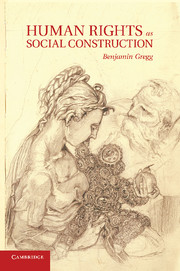Book contents
- Frontmatter
- Contents
- Acknowledgments
- Introduction
- Part I This-Worldly Norms: Local Not Universal
- Part II This-Worldly Resources for Human Rights as Social Construction
- 4 Cultural Resources
- 5 Neurobiological Resources
- Part III This-Worldly Means of Advancing the Human Rights Idea
- Part IV Human Rights, Future Tense: Human Nature and Political Community Reconceived
- References
- Index
4 - Cultural Resources
Individuals as Authors of Human Rights
Published online by Cambridge University Press: 05 January 2012
- Frontmatter
- Contents
- Acknowledgments
- Introduction
- Part I This-Worldly Norms: Local Not Universal
- Part II This-Worldly Resources for Human Rights as Social Construction
- 4 Cultural Resources
- 5 Neurobiological Resources
- Part III This-Worldly Means of Advancing the Human Rights Idea
- Part IV Human Rights, Future Tense: Human Nature and Political Community Reconceived
- References
- Index
Summary
Chapters 1 and 2 rejected traditional otherworldly foundations for human rights, specifically various theological and metaphysical understandings of human rights as universally valid a priori. Chapter 3 developed an alternative approach: human rights as initially valid only locally – valid only where locally embraced, and embraced because authored by their addressees. So conceived, human rights are this-worldly even as they retain a capacity for eventual, contingent, universal validity. This and the next chapter, which together form Part II, develop two practical resources – one cultural, one biological – for generating this-worldly human rights from local norms. This chapter develops the first of these resources: human personality as a product of socialization and capable of granting itself human rights. Such an approach can only be welcome given that we have no evidence that human rights exist independently of human imagination and social constructions, which is to say: no evidence that humans are endowed with pre-political, universally valid rights a priori. Why anyone might hope for such evidence is obvious: it might endow the human rights idea with moral objectivity and universal validity. At the same time, it would relieve humans of the burden of moral invention. (And what might weigh more heavily than providing for the moral welfare of all others?) Most efforts to provide such evidence claim a theological or metaphysical origin. They have never worked. This is still an issue because those efforts are again and again renewed instead of abandoned. But if, as I propose, human rights are regarded as cultural artifacts – socially constructed, contingently valid – then they appear as preferences of distinct human cultures at particular times in history.
To view them this way accords with viewing humans themselves as “cultural products” – insofar as they bear rights. To be “human,” says Hannah Arendt, is to be “political” in the sense of consciously having responsibilities to one's community. Hence a person outside that community (the refugee or stateless person, for example) is not “political” but merely a “human being in general,” subsisting in the existentially diminished condition of no political status or legal rights. The “loss of human rights…coincides with the instant when a person becomes a human being in general – without a profession, without a citizenship, without an opinion, without a deed by which to identify and specify himself” (Arendt 1994:302). Men without political community are “only men” in the sense that Giorgio Agamben (2005) describes as “la nuda vita” and Jacques Rancière (2004:298) as the “rights of those who are only human beings, who have no more property left than the property of being human.” But once in possession of those particular cultural constructs that are rights, the individual can be a good deal more than his or her merely biological self.
- Type
- Chapter
- Information
- Human Rights as Social Construction , pp. 87 - 110Publisher: Cambridge University PressPrint publication year: 2011

